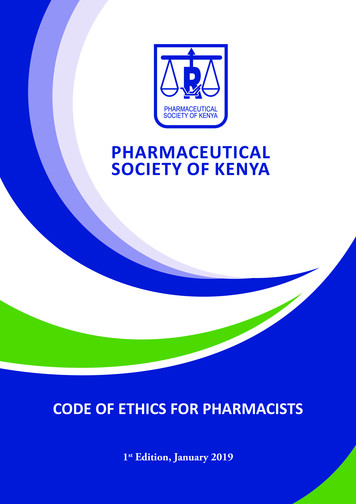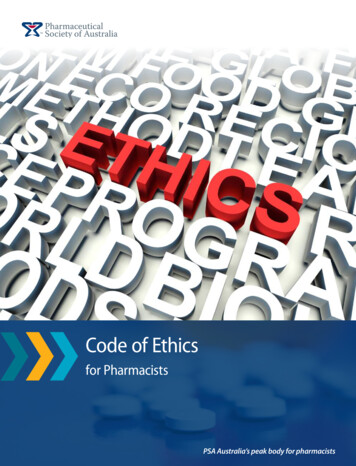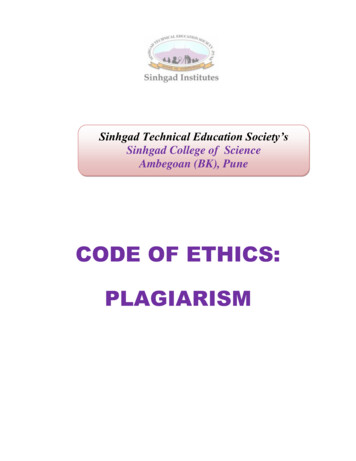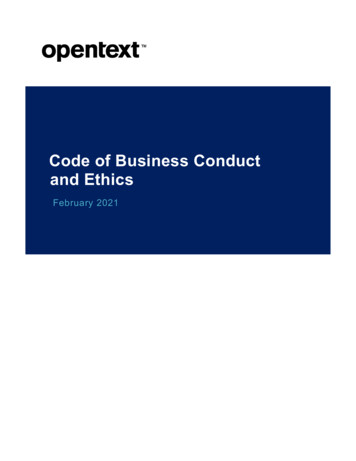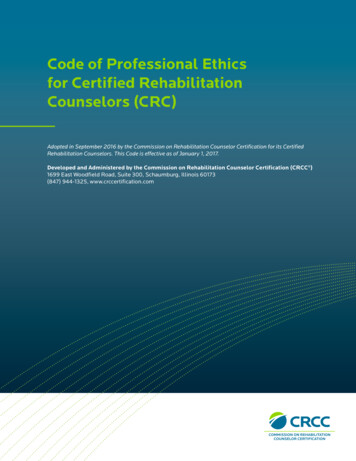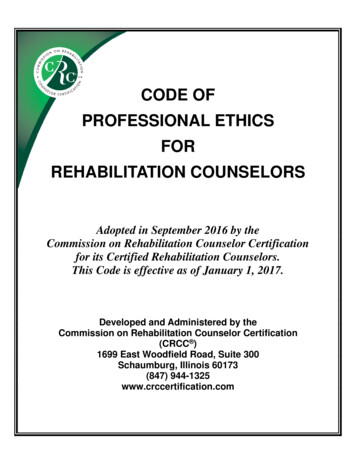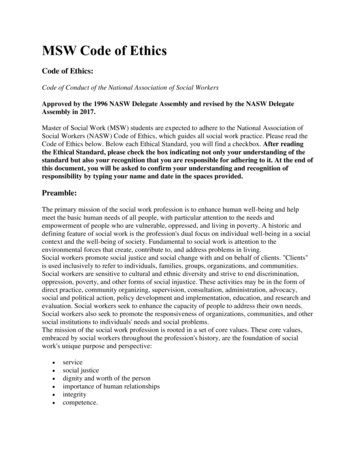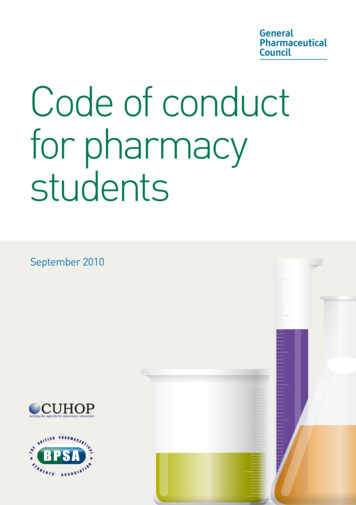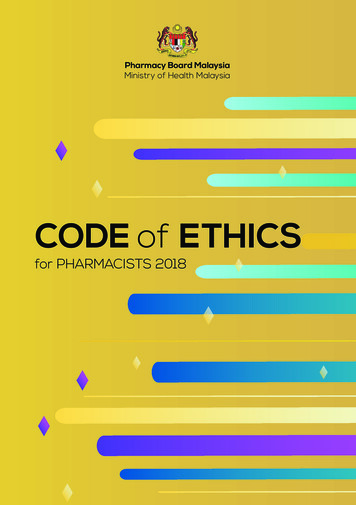
Transcription
Pharmacy Board MalaysiaMinistry of Health MalaysiaCODE of ETHICSfor PHARMACISTS 2018Code of Ethics for Pharmacists 2018i
Pharmacy Board MalaysiaMinistry of Health MalaysiaCode of Ethicsfor Pharmacists 20181 27Make patientsyour first concernUse professionaljudgement in theinterests of patientsand the publicBe responsibleof your workingpractices6Be ethical, honestand trustworthy5Develop yourprofessionalknowledge andcompetencePrinciples3Show respectfor others4Encourage patientsand the public toparticipate in decisionsabout their care
ContentsTitle CasePage7 Principles of Code of Ethics for Pharmacists 2018iPrinciple 1 - Make Patients Your First Concern1Principle 2 - U se Professional Judgement in the Interests ofPatients and the Public2Principle 3 - Show Respect for Others3Principle 4 - E ncourage Patients and the Public to Participate inDecisions About Their Care4Principle 5 - D evelop Your Professional Knowledge andCompetence5Principle 6 - Be Ethical, Honest and Trustworthy6Principle 7 - Be Responsible of Your Working Practices7Acknowledgements8
Principle 1 - Make Patients Your First ConcernThe care, well-being and safety of patients are at the heart of professionalpractice. Patients must always be your first concern. Even if you do not havedirect contact with patients your decisions or behaviour can still affect patientscare and safety.Pharmacists must:1.1 Ensure the product and services provided are safe and of acceptablequality.1.2 Take appropriate action to protect the interest and well-being of patientsand the public.1.3 Gather the information required to assess a patient’s needs to providethe appropriate treatment and care.1.4 Ensure the facilities, equipment and resources are available and inacceptable condition to provide appropriate professional services.1.5 Inform and educate patients or their caregivers about health and how touse and store their medicines in a correct manner.1.6 Refer patients to relevant healthcare providers when necessary.1.7 Keep records of professional services provided to patients.Code of Ethics for Pharmacists 20181
Code of Ethics for Pharmacists 20182Principle 2 - Use Professional Judgement in theInterests of Patients and the PublicA pharmacist is expected to use his professional judgement to deliver safeand effective care. Professional judgement may include balancing the needsof patients and public and at the same time, managing legal and professionalresponsibilities in order to decide the best option for the patient.Pharmacists must:2.1 Consider and act in the best interests of patients and the public inaccordance with the current and accepted evidence based practices.2.2 Ensure that professional judgement is not influenced by personal ororganisational interests, financial interests, incentives, targets or similarmeasures.2.3 Make responsible and effective use of resources in their practice.2.4 Consult and take advice from colleagues and other healthcareprofessionals when necessary.2.5 Be prepared to challenge the judgement of colleagues if needed in theinterest of the patients.2.6 In an emergency, consider all available options and weigh the benefitsand risks to the provision of best care of patients and the public.
Principle 3 - Show Respect for OthersShowing respect for other people is essential in forming and maintainingprofessional relationships.Pharmacists must:3.1 Treat people politely, be compassionate and considerate.3.2 Treat people fairly and ensure their views about belief, race, gender,age, disability, financial status, marital status or any other factors, do notaffect how they provide their professional services.3.3 Accept diversity and respect cultural differences and the right to holdpersonal values, opinions and beliefs when performing their professionalservices.3.4 Ensure if their religious or moral beliefs prevent them from providing aservice, explain and may refer patients to other providers.3.5 Respect and protect people’s dignity, privacy and confidentiality. Takeall reasonable actions to prevent accidental disclosure or unauthorisedaccess to confidential information. Never disclose confidential informationwithout consent unless required by the law.3.6 Ensure to provide the appropriate levels of privacy for patient consultations.3.7 Maintain proper professional boundaries in their relationships withpatients and others during the course of their professional practice andtake special care when dealing with vulnerable person. A vulnerableperson is someone who has a physical, intellectual or mental disabilityand is incapable of independent living.3.8 Obtain consent for the professional services provided.3.9 Obtain consent for the use of information in the course of their professionalpractice and use only for the purposes they were given it, or where thelaw permits.3.10 Ensure the use of social media, manual and electronic pharmacyinformation system is consistent with the practitioner’s ethical and legalobligations to protect privacy.3.11 Support environment issues on the safe disposal of drugs and relatedproducts.Code of Ethics for Pharmacists 20183
Code of Ethics for Pharmacists 20184Principle 4 - Encourage Patients and the Public toParticipate in Decisions About TheirCarePatients and the public are encouraged to be involved in decisions about theirtreatment and care. This needs effective communication.Pharmacists must:4.1 Work together in partnership with patients and the public, theircaregivers and other healthcare providers to manage their treatment andcare. Listen to patients and the public and respect their choices whereapplicable.4.2 Ensure that information is appropriately shared with other health andsocial care providers involved in the care of the patient.4.3 Communicate effectively with patients and the public and take reasonablemeasures to meet their communication needs.4.4 Provide information on the medicine including the risks and benefits, tohelp patients improve their compliance.4.5 Explain the options available to patients and the public, including risksand benefits, to help them make informed decisions. Make sure theinformation given is impartial, relevant, accurate and up to date.4.6 Consider and take reasonable actions, to address those factors that maybe preventing or deterring patients from getting or taking their treatment.4.7 Ensure that any service provided to person who cannot legally makedecisions about their care is in line with the appropriate requirements.
Principle 5 - D evelop Your Professional Knowledgeand CompetenceAccurate, current and relevant professional knowledge and skills are essential forsafe and effective practice. Development of knowledge, skills and professionalbehaviour must continue throughout a pharmacist’s working life which involveskeeping knowledge and skills up to date.Pharmacists must:5.1 Apply knowledge and skills appropriately to their practice.5.2 Recognise the limitations of knowledge, skills and practise only in theareas which they are competent.5.3 Keep their knowledge and skills up to date and relevant to maintain andimprove the quality of practice.5.4 Regularly monitor and reflect on their knowledge, skills and practice toundertake further education and training if necessary.5.5 Keep and maintain up-to-date record of their continuing professionaldevelopment.Code of Ethics for Pharmacists 20185
Code of Ethics for Pharmacists 20186Principle 6 - Be Ethical, Honest and TrustworthyPharmacists must behave in a way that justifies patients and public trust andmaintain the reputation of their profession.Pharmacists must:6.1 Act with honesty, integrity and do not compromise or abuse their positionto secure and maintain public trust and confidence in their profession.6.2 Not exploit the vulnerability or lack of knowledge of others when providingor recommending services.6.3 Recognise and endeavour to avoid conflicts of interest and declare anypersonal or professional interests they have.6.4 Ensure accurate and impartial information for publication, teaching orproviding services.6.5 Respond openly, honestly and courteously to complaints and criticism.6.6 Not discredit other healthcare professionals during their professionalservice.6.7 Uphold the sanctity of human life in any pharmaceutical research carriedout on human beings.
Principle 7 - Be Responsible of Your Working PracticesPharmacists shall maintain the highest professional standard in the dischargeof his professional service to his patients, clients and members of the alliedprofessions.Pharmacists must:7.1 Practise only if they are fit to do so.7.2 Actively participate and contribute to the development, education andtraining of colleagues and students, and share their skills, knowledgeand expertise.7.3 Take responsibility for all their professional activities, and for all activitiesundertaken under their direct supervision.7.4 Obey the laws, regulations, standards and policies of the profession.7.5 Assure that all standard operating procedures are up to date and arebeing followed.7.6 Consider getting professional indemnity to cover all their work, or workthat they are responsible for.7.7 Ensure only medicines and health related products that are safe, effectiveand of good quality being supplied.7.8 Make sure that there is an effective complaints procedure and issues arebeing addressed properly.7.9 Display a standard of behaviour that warrants the trust and respect ofthe community.7.10 Not advertise, directly or indirectly, for promoting their professionaladvantage, professional skills, knowledge or services other thanpermitted by legislation.7.11 Demonstrate leadership, teamwork and compassion in workplace.Code of Ethics for Pharmacists 20187
8Code of Ethics for Pharmacists 2018AcknowledgementsAdvisorDr. Salmah binti Bahri (RPh. 783)Senior Director of Pharmaceutical Services DivisionMinistry of Health MalaysiaEditorial CommitteeSalwati binti Abd Kadir (RPh. 1875)Pharmacy Board MalaysiaMinistry of Health MalaysiaDali bin Ismail (RPh. 1144)Kedah State Health DepartmentProf. Dr. Salmiah binti Mohd Ali (RPh. 641)Asia Metropolitan UniversityAmrahi bin Buang (RPh. 581)Malaysian Pharmaceutical SocietyWong Sie Sing (RPh. 700)Sarawak Pharmaceutical SocietyContributorsMohd Yunos bin Shaari (RPh. 1079)Pharmacy Board MalaysiaMinistry of Health MalaysiaNorhaliza binti Abdul Halim (RPh. 1750)Pharmacy Policy and Strategic Planning DivisionMinistry of Health MalaysiaSiti Hufaidah binti Suhimi (RPh. 3110)Pharmacy Board MalaysiaMinistry of Health MalaysiaDr. Azuana binti Ramli (RPh. 1889)Pharmacy Policy and Strategic Planning DivisionMinistry of Health MalaysiaMohammad Hafiz bin Othman (RPh. 4334)Pharmacy Board MalaysiaMinistry of Health MalaysiaAsniza binti Alias (RPh. 2447)Pharmacy Enforcement DivisionMinistry of Health MalaysiaSalina binti RasliPharmacy Board MalaysiaMinistry of Health MalaysiaSiti Mariaton binti Mokhsin (RPh. 2740)Pharmacy Enforcement DivisionMinistry of Health Malaysia
Hasrolnizam bin Abdullah (RPh. 2983)Pharmacy Enforcement DivisionMinistry of Health MalaysiaSalina binti Mohd Zamani (RPh. 2969)Pharmacy Enforcement DivisionMinistry of Health MalaysiaMohd Azaruddin bin Azis (RPh. 3511)Pharmacy Enforcement DivisionMinistry of Health MalaysiaMohammad Faizal bin Ahmat Zainuri (RPh. 4754)Pharmacy Enforcement DivisionMinistry of Health MalaysiaMohd Dziehan bin Mustapa (RPh. 4284)Pharmacy Practice and Development DivisionMinistry of Health MalaysiaLeona Tan Sze Ping (RPh. 5300)Pharmacy Policy and Strategic Planning DivisionMinistry of Health MalaysiaAbu Bakar bin IbrahimPharmacy Policy and Strategic Planning DivisionMinistry of Health MalaysiaAhmad Syamsury bin Sulaiman (RPh. 3235)Pharmaniaga Lifescience Sdn. Bhd.Mohd Nasrul bin Mohamad Noor (RPh. 3892)National Pharmaeutical Regulatory AgencyMinistry of Health MalaysiaIndra Shahril bin Abdul HamidNational Pharmaeutical Regulatory AgencyMinistry of Health MalaysiaDr. Nour Hanah binti Othman (RPh. 772)Hospital Kuala LumpurFuziah binti Abdul Rashid (RPh. 1359)Negeri Sembilan State Health DepartmentZubaidah binti Che’ Embee (RPh. 1071)Penang State Health DepartmentAinul Salhani binti Abdul Rahman (RPh. 2132)Hospital Shah AlamMohd Zawawi bin Abdullah (RPh. 2183)Terengganu Pharmacy Enforcement BranchNoraniza binti Ahmad (RPh. 2045)Penang Pharmacy Enforcement BranchMasliza binti Arip (RPh. 3607)Johor Pharmacy Enforcement BranchShamsudin bin Yuddin (RPh. 3225)Federal Territory of Kuala Lumpur PharmacyEnforcement BranchZaidi bin Ahmad (RPh. 2515)Perak Pharmacy Enforcement BranchAssoc. Prof. Dr. Siti Hadijah binti Shamsudin(RPh. 2000)International Islamic University MalaysiaAndrew Tan Eng Joo (RPh. 2083)Malaysian Pharmaceutical SocietyJohn Chang Chiew Pheng (RPh. 221)Malaysian Pharmaceutical SocietyJeff Kong Jiang Foong (RPh. 3126)Malaysian Pharmaceutical SocietyWong Siew Piin (RPh. 6045)Malaysian Community Pharmacy GuildFong Mei Ling (RPh. 8028)Malaysian Community Pharmacy GuildWong Ling Feng (RPh. 5454)Sarawak Pharmaceutical SocietyCode of Ethics for Pharmacists 20189
Code of Ethics for Pharmacists 201810Note
Code of Ethics for Pharmacists 201812www.pharmacy.gov.myPharmacy Board MalaysiaMinistry of Health Malaysia
7 Principles of Code of Ethics for Pharmacists 2018 i Principle 1 - Make Patients Your First Concern 1 Principle 2 - Use Professional Judgement in the Interests of
